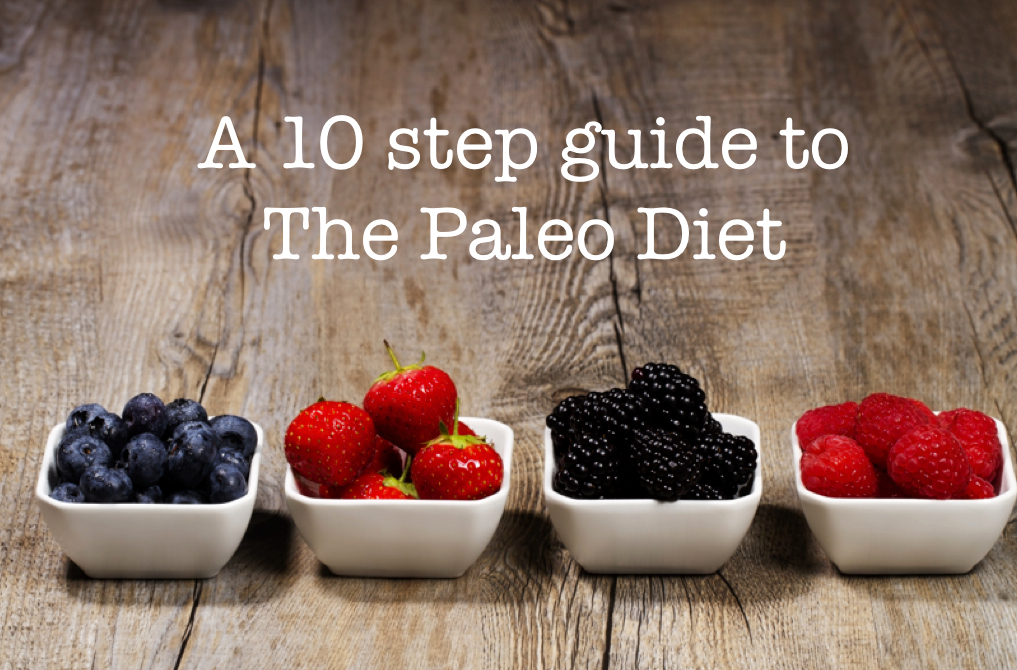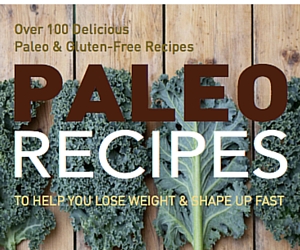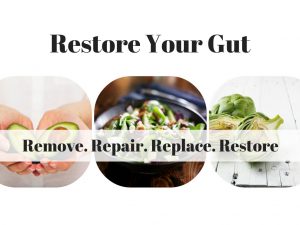The word ‘paleo’ makes many people think ‘caveman’ fad-diet, where you eat nothing but lean meats and veggies. But truthfully, that is not what the paleo diet is about at all. The paleo diet is about eating real food, maximizing nutrient-density, and minimizing toxic components in our diets and lifestyles. There are a few simple things we believe the paleo diet represents. Follow these 10 steps to a healthier and happier life.
1. Eat Real Food!
This is the single biggest thing you can do to improve your health. Real food means food that has come from nature – meat, fish, eggs, vegetables, fruits, nuts and seeds. The real nutrients lie in the bits of the animal we tend to ignore – liver, heart, feet, even brains. Studies of traditional diets have shown that human beings can thrive on a wide variety of different diets, and that there was no, one, ‘paleo’ diet. However, all studies of traditional people teach us that for optimum health you need to eat unprocessed foods. Try to buy fresh, seasonal and local produce whenever you can and cook your meals from scratch.
2. Eat Nutrient-Dense, Fresh, Whole Foods and Foods that are Good For Us.
The paleo diet in a nut-shell involves eating (mainly but not exclusively) foods available to our paleolithic ancestors, and the most nutritionally dense foods available, foods that will make us healthy and strong. It advocates avoiding foods that will harm our health, these foods happen to be ones that were not available throughout most of human history (processed food, refined sugar, grains and vegetable/seed oils). The most up to date and high-quality scientific research suggests that this also happens to be the best way to eat for optimum health.
3. Avoid Foods That Have Harmful and Detrimental Effects on the Body.
There are certain foods that everyone should avoid as they have been shown in many scientific studies to have harmful effects on our health. There are other foods that certain people may need to avoid, but that will be OK for others. The main foods we should all avoid are heavily processed factory-produced foods. Many of these foods are high in refined carbohydrates, sugar and vegetable oils, all of which are nutrient-poor and known to have detrimental effects on our health. Vegetable and seed oils such as sunflower and rapeseed oil are high in easily oxidized polyunsaturated fats and should be avoided. Peanuts and soy should be avoided. Most people will do better without any gluten-containing grains in their diet (wheat, rye, barley, spelt). Many of us will feel better by removing all grains and pseudo-grains from our diet, at least for a period of time. This means no rice, oats, corn, buckwheat, quinoa or amaranth. Dairy is highly individual. Some people definitely feel better without it but others can tolerate it without any problems. If you choose to include dairy in your diet you should opt for organic, full-fat dairy and preferably fermented so good choices would be kefir, yogurt or cheese.
4. Don’t be Afraid of Fat. Saturated Fat is Not Bad for Us!
I believed the ‘saturated fat is bad’ dogma for years and tried to eat a low fat diet based on starchy foods. However, in 2010 I read The Diet Delusion (Good Calories, Bad Calories) by Gary Taubes which totally transformed the way I thought about fat and sugar. It has absolutely NOT been proven that eating saturated fat causes heart disease. When you remove processed carbohydrates from your diet, you need to replace them with something else, and fats are an important source of calories. We need saturated fat and other fats for hormone production and a healthy metabolism.
5. Start with a Strict 30 Day Paleo Plan
For most people, a good introduction to paleo and to finding the diet that works for you is to start with a strict 30 day paleo plan. This means no grains, pulses, lentils or dairy. After 30 days you can reintroduce certain foods one by one to see whether you tolerate them and to craft your own personalised eating plan.
6. Support British food producers and other UK companies producing natural, organic and ethical products.
Before processed foods became abundantly available, before chemical fertilisers were invented and before we could ship products from half way across the world, most people ate local and seasonal produce that was organic by default. I believe this is still an important part of eating for optimal health and would encourage you to buy local British produce whenever possible, and organic if you can afford it.
7. Sit Less, Move More
Movement is just as important as diet when it comes to seeking optimal health but you don’t need to do as much as many people think. One of the most important things we can do for our health is simply to sit less during the day. After that, walking is one of the most effective exercises. Just half an hour of brisk walking per day will reduce your risk of almost every modern disease, from breast cancer to Alzheimer’s. If you want to do more then lifting weights is the next step. Despite what many people are often afraid of, it will not make you “bulky”, but the increase in muscle and strength will reduce your risk of obesity and diabetes. Endless running and other endurance training may not help towards your health goals. Research indicates that we should stick to short sprints or bursts of high intensity exercise with long recoveries.
8. Develop Healthy Sleep Habits
Most of us don’t sleep enough. Sleep is as important as diet in the pursuit of optimum health. Most people need 7-8 hours per night, and missing an hour or more on a regular basis is associated with poor appetite regulation, decreased metabolism, increased stress-hormone levels and diseases such as diabetes, heart disease and dementia. You will find that when you improve your diet your sleep and energy levels will improve. To help establish good sleep you should aim to go to bed and wake up at the same time every day, make sure your bedroom is completely dark and avoid TV, computers and phones for an hour before you go to sleep.
9. Address your Stress Levels
If you are chronically stressed then all the other lifestyle changes will be harder to implement and will not lead to the positive results you are looking for. It is important to try and reduce stress in our busy lives. Accept the things in your life that you can’t change rather than worrying about them. Yoga and Pilates are great stress reducers, as is walking. Though often dismissed, meditation and mindfulness have profound changes on the brain, which can even be seen on MRI scans. Switching off computers and phones an hour before bed as recommended above can go a long way to helping to reduce your stress levels.
10. Find What Makes you Happy
Finally, it is important to find what makes you happy. Try to factor in half an hour every day to do something that makes you feel happy – whether this is spending quality time with your loved ones, a quiet half hour reading a good book or taking a relaxing bath. Think about whether you are happy in your job and if there is anything you can do to change this if you are not. All the above positive health choices are pointless if you don’t feel happy in your day to day life so make this a priority!
If you want to give the paleo diet a go for 30 days, sign up for our 30 Day Paleo Weight Loss Plan. 30 days of REAL FOOD meal plans, shopping lists, recipes, advice, inspiration and motivation!






You must be logged in to post a comment.